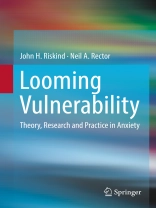This stimulating resource presents the Looming Vulnerability Model, a nuanced take on the cognitive-behavioral conceptualization of anxiety, worry, and other responses to real or imagined threat. The core feature of the model—the perception of growing, rapidly approaching threat—is traced to humans’ evolutionary past, and this dysfunctional perception is described as it affects cognitive processing, executive functioning, emotions, physiology, and behavior. The LVM framework allows for more subtle understanding of mechanisms of and risk factors for the range of anxiety disorders as well as for more elusive subclinical forms of anxiety, worry, and fear. In addition, the authors ably demonstrate how the LVM can inform and refine cognitive-behavioral and other approaches to conceptualization, assessment, and treatment of these often disabling conditions.
This important volume:
· Introduces the Looming Vulnerability Model in its evolutionary, developmental, cognitive, and ecological contexts.
· Unites diverse theoretical strands regarding anxiety, fear, and worry including work on wildlife behavior, experimental cognition and perception, neuroimaging, and emotion.
· Defines the looming cognitive style as a core aspect of vulnerability.
· Describes the measurement of the looming cognitive style, Looming Maladaptive Style Questionnaire, and measures of looming vulnerability for specific disorders.
· Details diverse clinical applications of the LVM across the anxiety disorders.
Spotlighting phenomena particularly relevant to current times, Looming Vulnerability, brings a wealth of important new ideas to researchers studying anxietydisorders and practitioners seeking more avenues for treating anxiety in their patients.
Cuprins
Introduction.- Evolutionary and Ecological Functions of Dynamic: Perceptions of Looming Danger.- Dynamic Information is Integral to Perception, Cognition and Emotion.- Basic Postulates of the Looming Vulnerability Model.- Dynamic Gains in Growing Threat and Threat Appraisal.- Effects of Moving and Looming Stimuli on Attention, Memory, and Fear Conditioning.- Experimental Studies Confirming the Emotional Impact of Dynamic Movement and Looming Manipulations.- Introduction to Looming Cognitive Style: Construct and Measurement.- Developmental Antecedents of the LCS, the LCS as an Overarching Theme of Anxiety, and Cognitive Vulnerability-Stress Interaction.- Looming Cognitive Style Contributes to Etiological Processes in Anxiety Disorders.- Looming Vulnerability in Generalized Anxiety Disorder.- Looming Vulnerability in Panic Disorder and the Phobias.- Looming Vulnerability in Obsessive Compulsive Disorder.- Exploring Potential Links between Looming Vulnerability and Post Traumatic Stress Disorder.- CBT for Reducing Looming Vulnerability Distortions: Translational Concepts and Clinical Applications.- New Directions in Research: Anxiety and Beyond.- Final Synthesis and Conclusions.
Despre autor
John Riskind is a Professor of Psychology at George Mason University, and a former Director of research in the Department of Psychiatry at the University of Pennsylvania at the Center for Cognitive Therapy with Aaron Beck. He is the author of numerous articles on cognitive styles and mechanisms in anxiety, has co-edited a book with Lauren Alloy and others on Cognitive vulnerability to emotional disorders with Lauren Alloy (Lawrence Erlbaum). He has also coauthored a textbook with Alloy, Abnormal Psychology: Contemporary Perspectives (Mc Graw Hill). He is the founding editor of the International Journal of Cognitive Therapy, a former editor of the Journal of Cognitive Psychotherapy, and associate editor of Cognitive Therapy and Research.
Neil A. Rector is a Full Professor in the Departments of Psychiatry and Psychological Clinical Scienceat the University of Toronto and a Senior Research Scientist and the Director of Research at the Frederick W. Thompson Anxiety Disorders Centre, Department of Psychiatry, Sunnybrook Health Sciences Centre. His current research and clinical interests focus on the study of cognitive and behavioural mechanisms of vulnerability in the development and persistence of anxiety, mood, and OCD disorders and their treatment with cognitive-behavioural therapy (CBT). His research has received funding from the Canadian Institutes of Health Research, Social Sciences and Humanities Research Council of Canada, and the Ontario Mental Health Foundation and resulted in more than 120 scientific publications and 7 published books. In addition to having an active CBT practice, Dr. Rector trains and supervises psychology and psychiatry residents, runs workshops nationally and internationally, and is the past Co-Director of the University of Toronto’s Continuing Medical Education Intermediate and Advanced CBT courses.












